Connecting your Amazon, Shopify, or eBay sales to accounting software should make bookkeeping simpler. For many UK sellers, though, automation still comes with a learning curve - especially when VAT, OSS, and multi-channel data are involved.
A2X has earned its reputation as a reliable e-commerce accounting integration. It automatically summarises sales, fees, and refunds, then posts them into Xero or QuickBooks so reconciliation lines up cleanly with your bank deposits. Accountants often recommend it for accuracy and consistency.
However, UK sellers frequently note that A2X still requires time to configure VAT and tax mappings correctly. Its assisted setup provides helpful templates, but sellers must review and refine these settings to stay compliant with UK and EU tax rules.
That’s where Link My Books enters the conversation. Built in the UK, it offers a similar level of automation while applying VAT and OSS logic automatically. Its pricing model also differs - Link My Books charges based on order volume across all channels, rather than by channel, making it more predictable for multi-channel businesses.
In this guide, we’ll compare how A2X and Link My Books handle VAT compliance, pricing, and setup for UK sellers so you can decide which tool best fits your workflow and budget.
Key Takeaways from this Post
A2X delivers reliable reconciliation. It automates sales and payouts accurately but requires sellers to review VAT and OSS mappings during setup.
Link My Books simplifies VAT compliance. It automatically applies UK and EU tax rules across Amazon, eBay, Shopify, and other channels, reducing manual configuration.
Pricing differs significantly. A2X charges per channel, while Link My Books uses an order-based model that includes multiple marketplaces under one plan - often saving multi-channel sellers time and cost.







Overview of A2X and Link My Books for E-commerce Sellers
Both A2X and Link My Books were designed to solve the same fundamental challenge: reconciling complex e-commerce data with accounting software like Xero and QuickBooks Online. Instead of manually exporting reports from Amazon, Shopify, or eBay and trying to match figures to bank deposits, these tools automate that process by creating summary entries that align perfectly with payouts.
A2X has been a trusted solution in this space for years. It’s widely used by accountants and larger sellers for its consistency and accuracy, particularly across major marketplaces such as Amazon and Shopify. Its approach focuses on reliability and data integrity - producing clean journal entries that match settlement reports exactly.
Link My Books, while newer, was built specifically with UK and EU sellers in mind. It offers the same level of accuracy but adds automatic VAT and OSS logic, something UK sellers often find missing from generic global tools. It also integrates with more emerging sales channels - including TikTok Shop, Square, and WooCommerce - under a single plan.
In practice, both tools achieve the same outcome: cleaner books, faster reconciliation, and fewer errors. The main differences lie in setup complexity, VAT handling, and pricing structure, which we’ll explore in more detail throughout this comparison.
A2X at a Glance
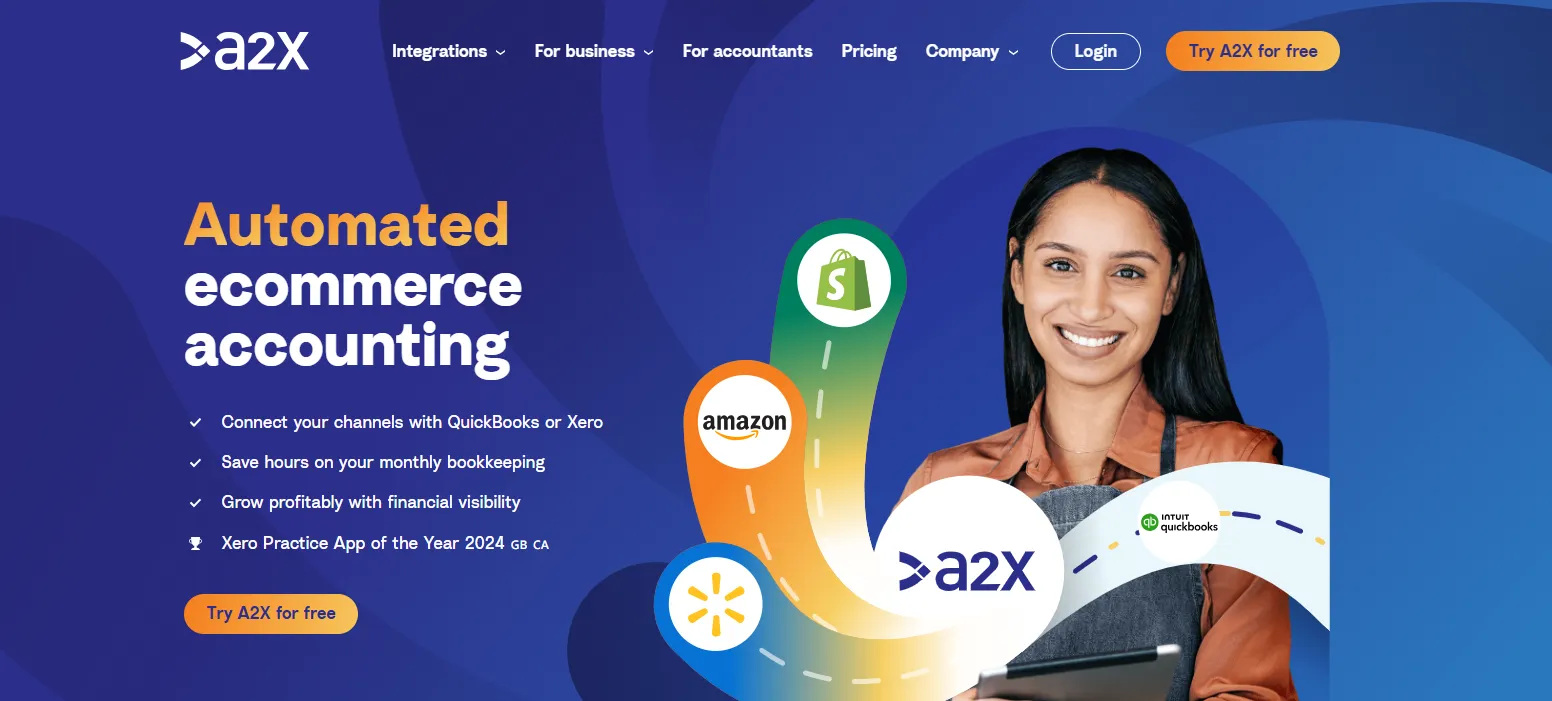
A2X is one of the most established accounting automation tools for e-commerce sellers. It connects major marketplaces such as Amazon, Shopify, eBay, Etsy, Walmart, and BigCommerce to accounting platforms including Xero, QuickBooks Online, and NetSuite.
Its purpose is simple: to turn messy settlement data into clean, reconciled journal entries that match your bank deposits to the cent.
What A2X Does Well
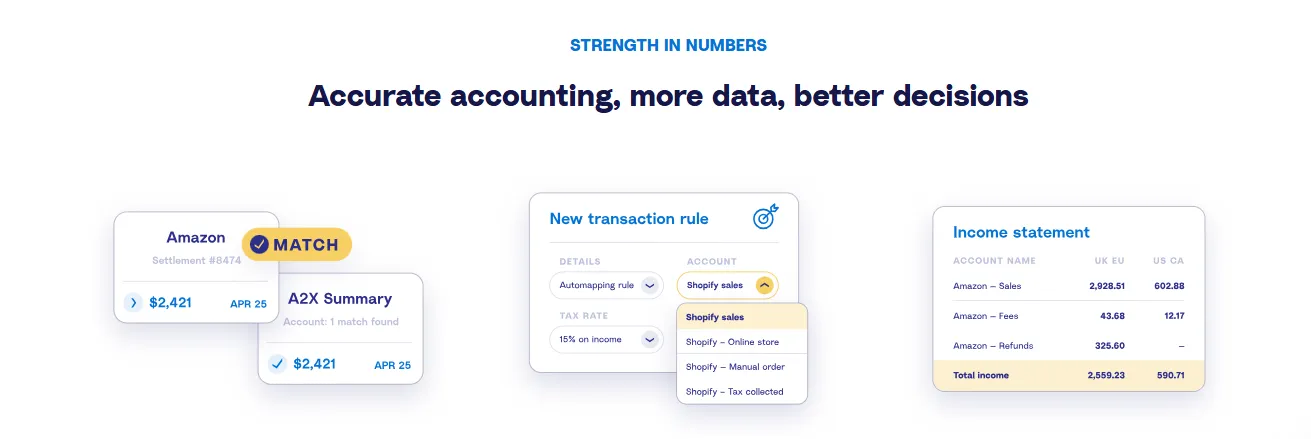
- Accurate payout summaries: A2X converts complex marketplace data (including sales, fees, refunds, and taxes) into summarized invoices or journals that align with each deposit. This ensures reconciliation in Xero or QuickBooks is accurate and straightforward.
- Reliable performance at scale: A2X is known for stability and consistency, even for large-volume sellers and accounting firms managing multiple marketplaces.
- NetSuite integration for enterprises: A2X offers a direct connection to NetSuite, providing a bridge for enterprise users who need ERP-level functionality.
- COGS tracking: Sellers can upload SKU-level cost data or use Shopify’s “Cost Sync” to calculate cost of goods sold and track gross profit margins accurately.
- Support and resources: Users frequently highlight A2X’s detailed documentation, responsive support, and one-to-one onboarding sessions available on premium plans.
What Most E-commerce Sellers Don’t Consider with A2X
While A2X is trusted for its precision, several practical factors are worth noting:
- Manual VAT setup: A2X provides assisted templates for UK VAT mapping, but sellers still need to refine these settings manually to ensure compliance with HMRC and OSS rules.
- Per-channel pricing: Each marketplace connection (Amazon, Shopify, etc.) is billed separately, meaning costs increase as your business expands across channels.
- Limited UK-specific automation: Although accurate, A2X does not apply UK VAT logic automatically - UK sellers must configure it during setup.
- Complex onboarding for new users: Account and tax mapping can be time-consuming, especially without accountant assistance.
Despite these considerations, A2X remains one of the most dependable tools for sellers who value accuracy and control over automation settings.
Link My Books at a Glance
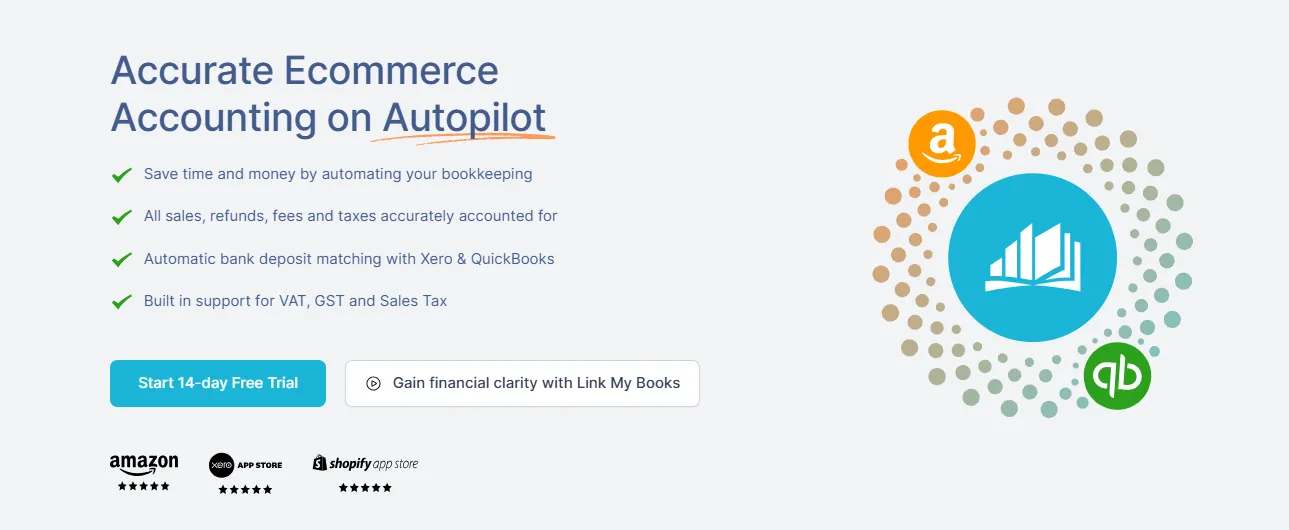
Link My Books is a UK-built accounting automation tool that connects major e-commerce platforms directly to Xero and QuickBooks Online. It was designed to simplify bookkeeping for sellers who need accurate VAT handling and seamless multi-channel reconciliation.
Unlike traditional integrations that focus solely on data transfer, Link My Books applies UK and EU VAT logic automatically - ensuring that sales, refunds, fees, and taxes are mapped to the right accounts every time.
What Link My Books Does Well
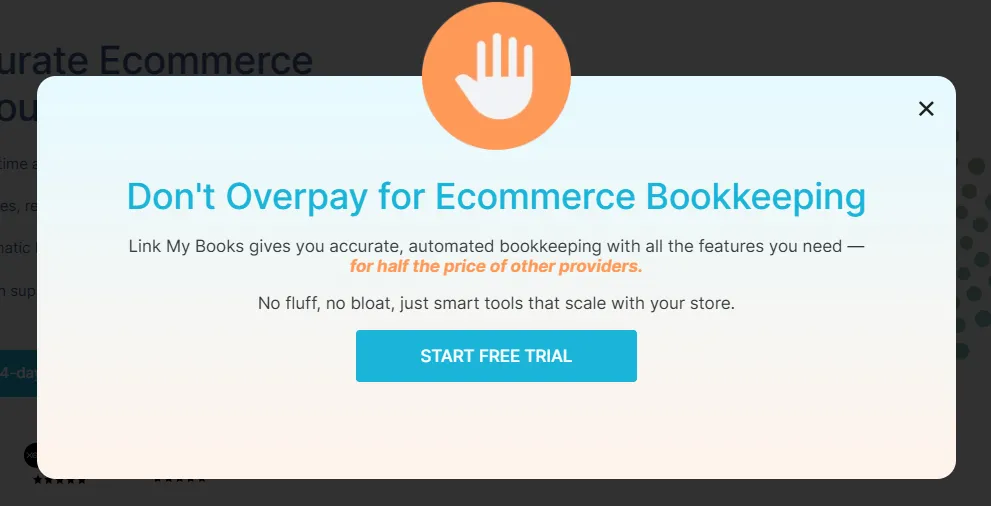
- Automatic VAT and OSS mapping: The platform recognises when VAT is collected by marketplaces such as Amazon or eBay and applies the correct treatment under UK and EU rules. Sellers don’t have to manually separate marketplace-collected tax from seller-collected VAT.
- Multi-channel support under one plan: Link My Books lets users connect all their sales channels (including Amazon, eBay, Shopify, Etsy, TikTok Shop, Walmart, Square, and WooCommerce) without paying extra per channel. Pricing scales only with total monthly order volume.
- Guided setup wizard: The setup process is built for non-accountants. A step-by-step wizard walks users through account mappings and tax settings, meaning most sellers are up and running within minutes.
- Accountant-backed support: Every member of the support team is a qualified accountant. Users frequently highlight how this helps resolve VAT or reconciliation queries quickly and accurately.
- Profitability and benchmarking insights: Beyond reconciliation, Link My Books provides tools to track profit margins and benchmark performance against industry averages. This adds advisory value for accountants managing multiple clients.

Want to see what Link My Books can do for you?
👉You can try it out for 14 days, free of charge!
Where Sellers Face Minor Challenges
- Learning curve for first-time users: The tax mapping step can feel technical for sellers new to bookkeeping, though guided setup reduces confusion.
- Historical data limits: Access to older data depends on plan tier, with higher tiers allowing up to two years of imports.
For most UK and EU sellers, Link My Books offers a faster, more compliant approach to e-commerce accounting - combining automation, VAT accuracy, and accountant-level support under one streamlined platform.
A2X vs Link My Books: A Detailed Comparison
Both tools automate payout reconciliation for major marketplaces and post clean summaries into Xero or QuickBooks. The differences most UK sellers feel day to day relate to VAT handling, pricing structure, onboarding effort, and breadth of supported channels.
Side-by-side overview
The Bottom Line
- If you value ERP alignment or already run NetSuite, A2X’s ecosystem may fit better.
- If you prioritise UK VAT automation across several channels under one plan, Link My Books may reduce setup effort and ongoing cost.
- Both can deliver accurate books. The decision often comes down to how much manual VAT configuration you want to own, your channel mix, and whether an ERP is in scope.
A2X vs Link My Books: Setup and Ease of Use
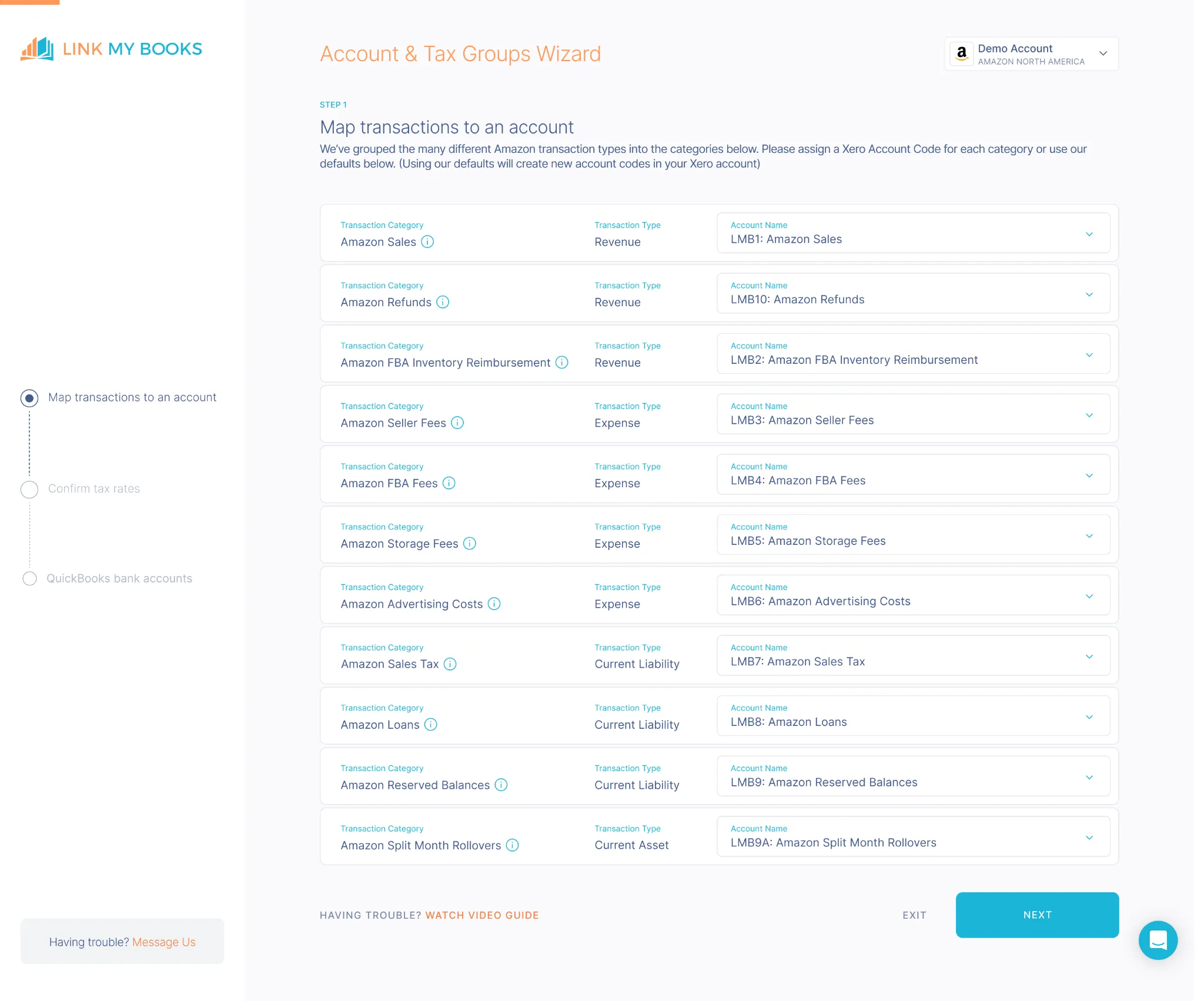
Ease of setup can be the difference between getting automation working within minutes or spending several sessions mapping accounts and testing VAT codes. Both A2X and Link My Books guide users through onboarding, but their approaches differ in scope and complexity.
Setting up A2X
- Step 1: Connect your accounts: Users link their Amazon, Shopify, or other sales channels to A2X, then connect their accounting software (Xero, QuickBooks, or NetSuite).
- Step 2: Configure accounts and tax mappings: A2X provides an assisted setup wizard that automatically suggests income, fee, and tax accounts based on your region and VAT registration status. However, you’ll need to review and confirm these mappings manually.
- Step 3: Review and post settlements: Once connected, A2X imports settlements and creates draft invoices or journals. Before posting, users verify VAT treatment, expense categories, and mapping accuracy.
Implication for UK sellers: A2X provides structure and control but expects familiarity with chart of accounts, VAT rules, and accounting workflows. It’s well-suited for accountants or advanced users who prefer to fine-tune every setting.
Setting up Link My Books
- Step 1: Connect your accounts: Users start by connecting their sales channels (Amazon, Shopify, eBay, Etsy, etc.) and linking Xero or QuickBooks Online.
- Step 2: Guided setup wizard: A simple, step-by-step process walks users through mapping categories and VAT rules. UK and EU sellers benefit from pre-applied VAT logic - the system automatically detects whether taxes were collected by the marketplace or by the seller.
- Step 3: Sync and review: Once connected, Link My Books fetches your payouts, creates summary invoices, and posts them directly into your accounting software. Each summary aligns perfectly with your bank feed, making reconciliation straightforward.
Implication for UK sellers: Link My Books was designed for simplicity without losing accuracy. The guided setup reduces setup friction and eliminates most of the manual mapping work, making it approachable even for non-accountants.
The Takeaway
- A2X provides more flexibility and control during setup, ideal for accountants or sellers comfortable with detailed VAT mapping.
- Link My Books focuses on speed and accessibility, guiding users through setup with pre-mapped UK/EU VAT logic.
✅ Both produce accurate results once configured - the main difference lies in how much manual intervention you prefer during onboarding.
A2X vs Link My Books: VAT and Tax Handling
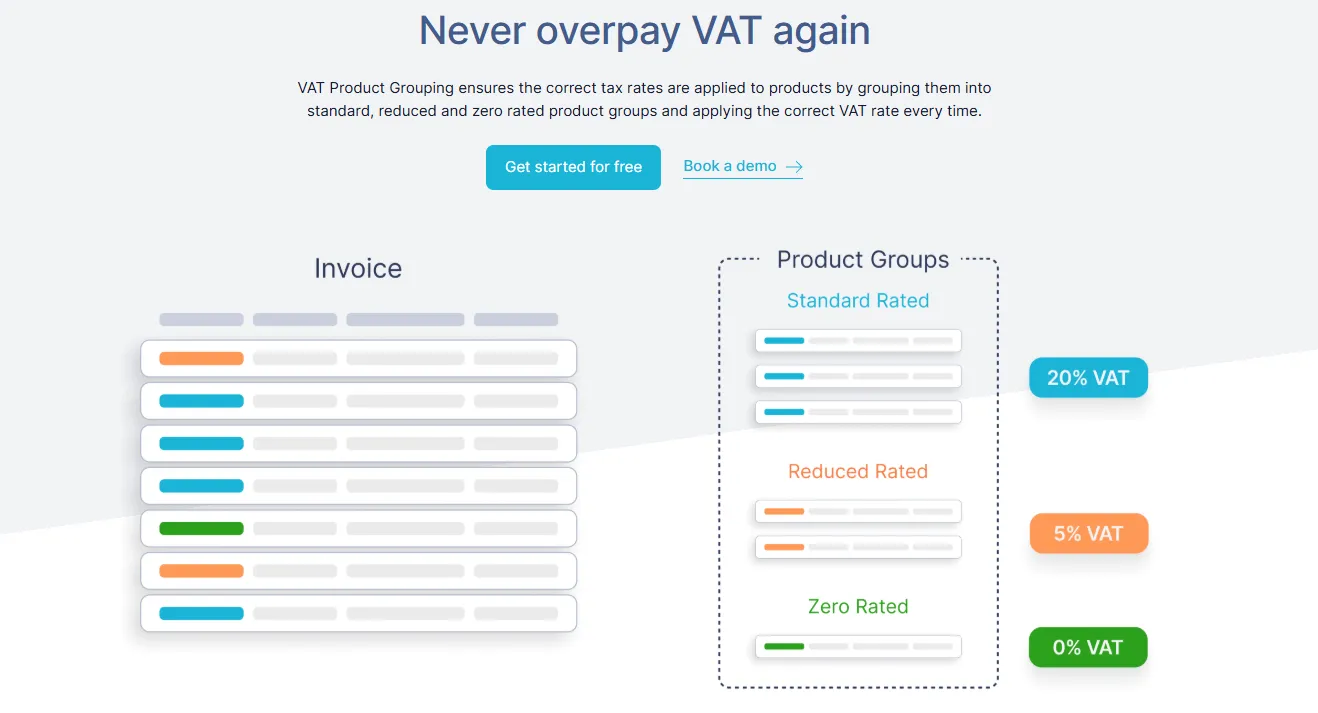
Getting UK VAT and EU OSS right is where many sellers spend the most setup time. Both tools can produce accurate results once configured, but they approach VAT differently.
How A2X handles VAT and OSS
- Assisted setup with templates: For new Amazon and Shopify accounts, A2X can auto-apply default accounts and tax-rate mappings based on your region and registration details. You then review and refine these during onboarding.
- Advanced mapping rules available: Power users can enable granular rules for UK VAT, OSS/IOSS, and other regions to control treatment at a detailed level.
- Marketplace-collected tax visibility: A2X separates Marketplace Facilitator VAT or tax lines so you can map them correctly and avoid double-counting, but you still confirm the accounting treatment.
Implication for UK sellers: A2X provides guidance and structure, but you typically make and maintain the VAT decisions. This suits teams that prefer granular control or already work closely with an accountant. For a more detailed breakdown down visit A2X support.
How Link My Books handles VAT and OSS
- Automatic VAT logic for UK/EU: LMB’s setup applies UK VAT and EU OSS rules by default across channels, distinguishing marketplace-collected tax from seller-collected VAT. You can still adjust mappings as needed.
- UK-focused presets and guidance: The help center provides UK-specific account and tax mappings and articles covering distance-sales thresholds, country grouping, and VAT checks.
Implication for UK sellers: LMB aims to reduce manual VAT configuration up front while keeping edits possible. This can shorten time-to-accuracy for non-accountants and multi-channel teams. For a deeper dive, see Setting up UK VAT.
The Takeaway
✅ Both tools are accurate once mappings are confirmed.
- A2X offers detailed control via assisted and advanced rules, with users typically finalising VAT/OSS settings themselves.
- Link My Books leans into automatic UK/EU VAT treatment and marketplace-tax separation during setup, aiming to minimise manual steps while allowing overrides.
A2X vs Link My Books: COGS and Profit Tracking
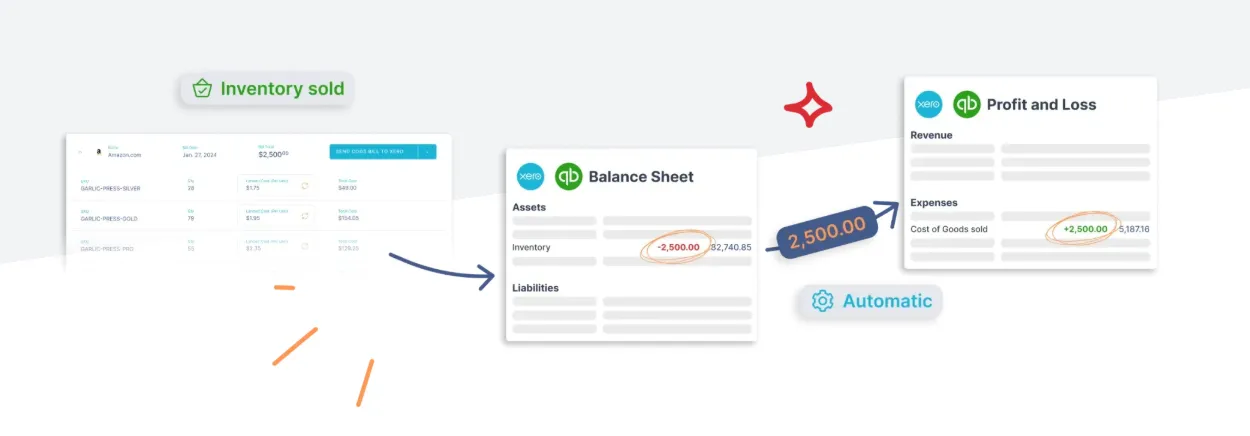
Accurate cost of goods sold (COGS) tracking helps sellers understand their true profit margins, not just their sales totals. Both A2X and Link My Books support this feature, but they handle it at different levels of complexity.
How A2X manages COGS
- SKU-level cost uploads: Users can upload SKU cost data directly into A2X. Once the data is in place, A2X automatically generates COGS entries each time a settlement is processed.
- Shopify “Cost Sync”: For Shopify users, A2X integrates with Shopify’s native “Cost per Item” field, syncing those costs automatically into COGS calculations.
- Advanced landed cost support: A2X integrates with third-party tools like Settle to account for additional landed costs such as duties, tariffs, or freight. This provides a more detailed view of product profitability, particularly useful for import-heavy sellers.
A2X’s granular COGS setup is valuable for large operations with diverse product ranges or international supply chains. However, it can feel more technical to configure for small businesses that just want summary-level COGS visibility.
How Link My Books manages COGS
- Simple COGS automation: Link My Books allows users to upload SKU costs or map COGS accounts directly within its setup wizard. Each settlement then automatically posts the corresponding COGS entries into Xero or QuickBooks.
- Profitability insights: Beyond accounting entries, Link My Books provides margin and profitability analysis dashboards, helping sellers understand gross profit trends across all their channels, without needing an external analytics tool.
- Ease of maintenance: Because COGS tracking is embedded in the reconciliation workflow, updates happen automatically when new SKUs or cost data are imported.
For most small to mid-sized e-commerce businesses, Link My Books’ simplified approach to COGS tracking provides sufficient accuracy with minimal setup.

The Takeaway
- A2X offers deeper landed cost and SKU-level COGS integration, appealing to enterprise and import-heavy sellers.
- Link My Books provides streamlined, accessible COGS tracking suited to SMBs that prioritise clarity and speed over advanced cost layering.
✅ Both tools ensure accurate COGS entries reach the accounting system, but their complexity and depth differ based on seller scale.
A2X vs Link My Books: Integrations and Scalability
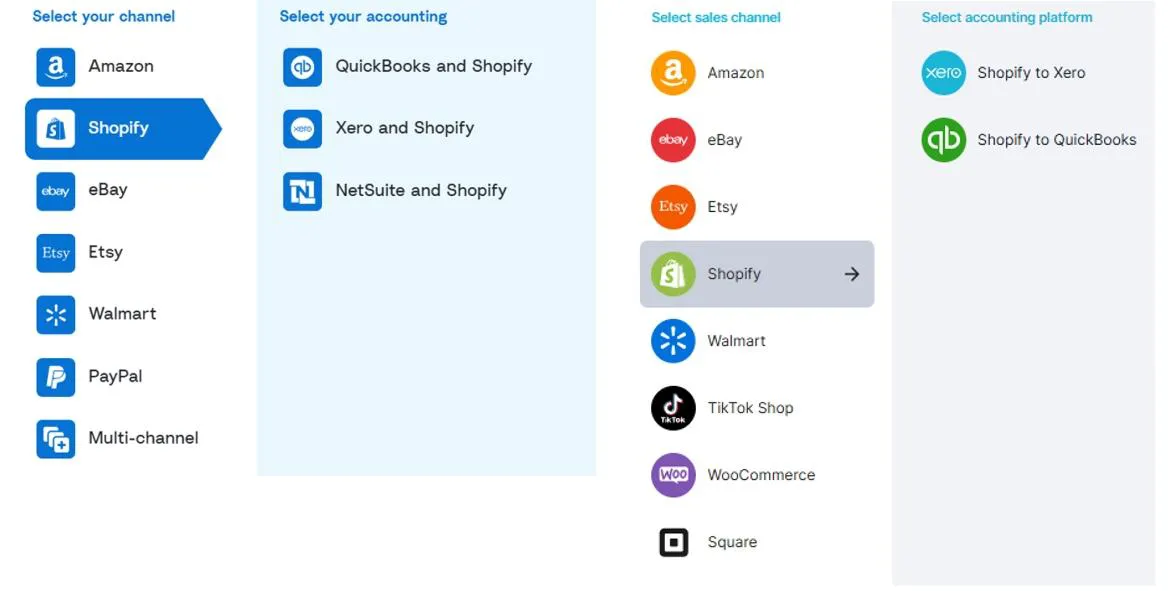
Integration breadth and scalability determine how well an accounting automation tool fits as a business grows. Both A2X and Link My Books integrate deeply with key e-commerce platforms and accounting systems, but their focus areas diverge.
How A2X approaches integrations
- Supported marketplaces: A2X connects with Amazon, Shopify, eBay, Etsy, Walmart, and BigCommerce. These integrations cover the largest global marketplaces and shopping carts, making it a strong fit for sellers with high transaction volumes.
- Accounting and ERP systems: In addition to Xero and QuickBooks Online, A2X integrates directly with NetSuite, offering ERP-level functionality for larger operations. This is a significant differentiator for enterprise teams that manage accounting at scale.
- Multi-account capability: A2X supports multiple store connections, allowing accountants and aggregators to manage multiple clients or regions from one dashboard.
- Scalability: Because A2X’s infrastructure is built to handle large datasets, it scales efficiently for sellers managing tens of thousands of orders per month.
A2X’s integrations are ideal for established or enterprise-level sellers using NetSuite or managing multi-region Amazon and Shopify operations. The trade-off is that ERP-level scalability comes with higher pricing and a steeper setup curve.
How Link My Books approaches integrations
- Supported marketplaces: Link My Books integrates with Amazon, eBay, Shopify, Etsy, TikTok Shop, Walmart, Square, and WooCommerce. This mix caters to modern, multi-channel sellers, including those using newer UK and EU marketplaces.
- Accounting systems: Link My Books connects seamlessly to Xero and QuickBooks Online, automatically posting summarised invoices or journals that match payout data.
- Multi-channel coverage: All supported channels can be connected under one subscription plan, simplifying multi-platform management without incremental cost.
- Scalability: For small to mid-sized businesses, Link My Books scales naturally with order volume. Sellers can upgrade plan tiers as sales increase, maintaining performance without technical reconfiguration.
Link My Books prioritises broad channel coverage within the Xero/QuickBooks ecosystem. While it doesn’t support ERP systems like NetSuite, its flexibility and predictable pricing make it a strong fit for growing SMBs managing several online stores.
The Takeaway
- A2X offers a broader enterprise reach, with NetSuite integration and strong performance for high-volume, multi-region sellers.
- Link My Books provides a simpler, more cost-efficient model for SMBs focused on Xero and QuickBooks, supporting a wider variety of emerging sales channels relevant to UK and EU markets.
✅ Both scale effectively - A2X vertically into enterprise ERP environments, Link My Books horizontally across multiple e-commerce channels.
A2X vs Link My Books: Customer Support

Support quality plays a major role in how quickly sellers get value from automation tools. Both A2X and Link My Books maintain strong reputations for responsive, knowledgeable support, but they differ in style and focus.
How A2X supports its users
- Multi-channel helpdesk: A2X provides support through live chat, email, and an extensive self-service help centre. The help library covers detailed setup, tax mapping, and troubleshooting articles for Amazon, Shopify, and NetSuite users.
- Assisted onboarding for premium plans: Higher-tier and NetSuite users can access one-to-one onboarding calls with A2X specialists. This is particularly useful for accountants managing multiple clients or complex setups.
- Community reputation: Reviews on platforms like G2, Trustpilot, and the Xero App Store frequently highlight A2X’s professional and responsive support. Many users mention receiving clear explanations and patient guidance when resolving mapping or connection issues.
- Limitations noted in reviews: Some smaller sellers mention waiting longer for responses on basic plans, or finding setup questions answered through documentation rather than live sessions. This generally reflects plan level rather than support quality.
A2X’s support is structured and reliable, especially for those on professional or enterprise tiers. For first-time users on entry plans, setup help relies mainly on the support centre and documentation.
How Link My Books supports its users
- Accountant-led support team: All members of Link My Books’ support team are qualified accountants based in the UK. This means sellers get accounting advice as well as technical help when configuring VAT, OSS, or reconciliation settings.
- Fast response times: User reviews consistently mention same-day responses — often within an hour - even outside standard UK working hours. For many sellers, this responsiveness reduces downtime during setup or reconciliation.
- Onboarding guidance for all plans:
Unlike tiered onboarding models, Link My Books offers hands-on guidance and screen-sharing sessions across all plan levels. - Community feedback:
On Trustpilot and the Xero App Store, Link My Books regularly earns five-star ratings, with reviewers praising its “human touch” and VAT expertise. - Limitations:
As a UK-based company, Link My Books’ live availability aligns with UK and EU time zones. US or APAC users may rely more on asynchronous chat or email support.
Support from qualified accountants makes a difference for VAT-related questions. Sellers who value real accounting insight (rather than just technical help) often find Link My Books particularly strong here.
The Takeaway
- A2X provides reliable, structured support with comprehensive documentation and optional onboarding calls for advanced plans.
- Link My Books stands out for its accountant-led, UK-based support team that offers fast and detailed responses at all plan levels.
✅ Both are well-reviewed; the right choice depends on whether you prefer software-driven support or direct access to accounting expertise.
A2X vs Link My Books: Analytics and Extras
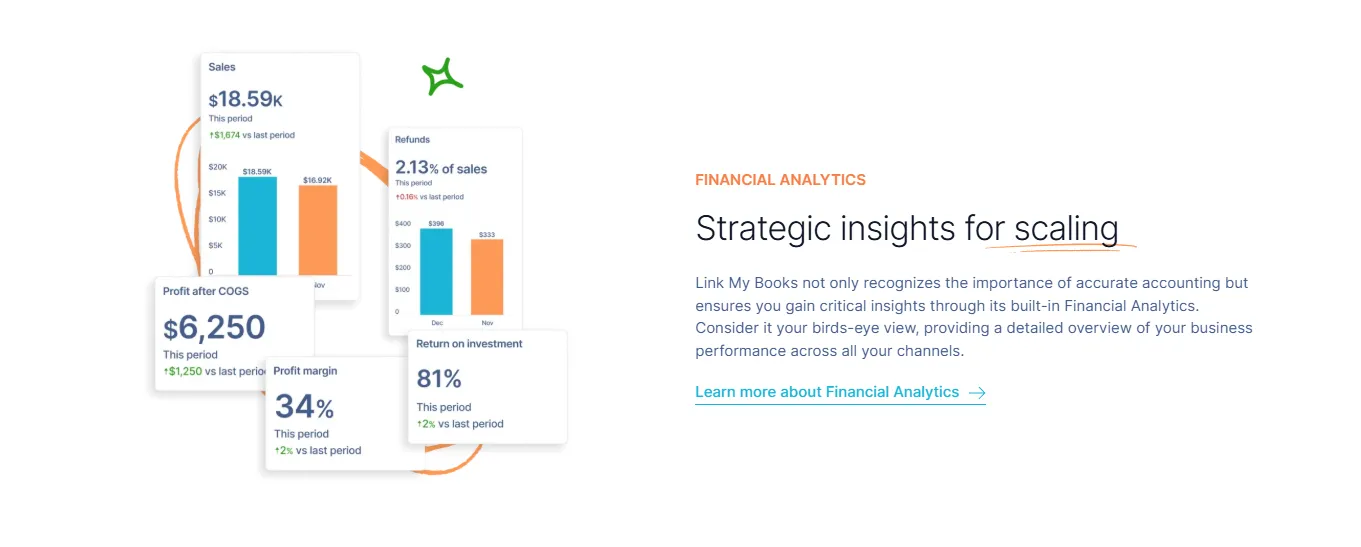
Beyond reconciliation, sellers increasingly expect accounting integrations to provide insight, not just accuracy. While both A2X and Link My Books focus on automating bookkeeping, their approaches to analytics and value-added features differ in scope and intent.
How A2X handles analytics and reporting
- Reconciliation-focused data: A2X’s core strength lies in precision. It organises settlement data into clean summaries that reflect sales, fees, and taxes exactly as recorded by marketplaces. This produces highly reliable data for accountants and auditors, ensuring books are accurate and HMRC-ready.
- COGS and profit tracking: Through its cost uploads and landed cost integrations, A2X provides indirect insight into profit margins. However, analysis happens outside the platform - usually within accounting software or third-party BI tools.
- Export flexibility: A2X supports CSV exports and integrations with reporting tools, giving accountants the freedom to build their own dashboards.
A2X prioritises accuracy over analysis. It’s an excellent data source for accountants who already use reporting tools, but it doesn’t offer built-in profitability or benchmarking dashboards.
How Link My Books handles analytics and reporting
- Built-in profitability dashboards: Link My Books includes clear visual summaries showing total sales, fees, VAT, and profit margins per channel. This gives sellers and accountants a snapshot of business performance without leaving the platform.
- Industry benchmarking: Users can compare performance metrics against aggregated data from other sellers, helping them gauge efficiency and profitability across sectors.
- Cross-channel insights: Because Link My Books connects multiple marketplaces under one plan, users can track combined or individual channel performance — useful for identifying which channels are most profitable.
Link My Books blends bookkeeping automation with actionable insight. For small and mid-sized sellers, built-in analytics reduce reliance on spreadsheets or external dashboards.
The Takeaway
- A2X delivers the cleanest data foundation, ideal for accountants and enterprise teams who build their own financial dashboards elsewhere.
- Link My Books adds out-of-the-box profitability and benchmarking features that simplify decision-making for smaller sellers and accountants managing many clients.
✅ Both serve their audiences well - A2X for data precision, Link My Books for immediate visibility into performance.
A2X vs Link My Books: Pricing for UK Sellers
Pricing is one of the biggest factors when choosing between A2X and Link My Books, especially for sellers operating across multiple marketplaces. Both tools use subscription tiers, but their pricing structures work very differently.
How A2X pricing works
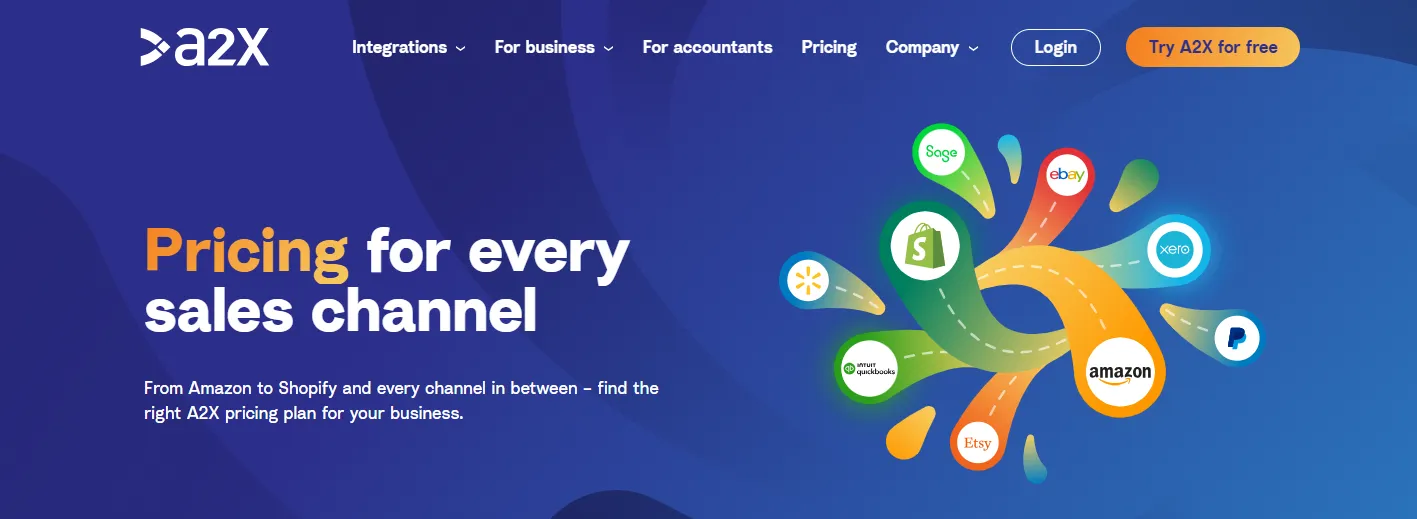
Per-channel pricing. One plan per marketplace. Multi-channel bundles exist, but cost scales rapidly with channels and order volumes.
- Amazon integration starts at $29/month for low-volume users (Mini tier).
- Higher tiers cover more orders: e.g. Standard ($79 for up to 5,000 orders), Standard 10K ( $159 ), Premium 15k, etc.
- Multi-channel plans allow combining multiple marketplaces under one umbrella plan. E.g. Multi 1K costs $89/month (for up to 1,000 orders across two channels).
- As order volume increases, so does the cost dramatically. They clearly highlight how moving from 5,000 to 10,000 orders can more than double pricing.
❗Every additional marketplace or rising order volume may require upgrading tiers or paying for a multi-channel package.
How Link My Books pricing works

Order-based pricing. One plan covers all connected channels
- Link My Books emphasizes a scaling pricing model that charges based on your monthly cumulative order count across all channels, rather than per channel.
- Your order-volume tiers (200, 1k, 5k, 10k, etc.) are reference points - not separate channel plans.
- Entry pricing begins at $17/month (or equivalent), depending on volume.
- Unlimited marketplaces and seller accounts are supported under this dynamic model.
You can try out our interactive pricing tool and see where you land:
[cms-pricing-tool]
✅Sellers can add new sales channels without a discrete “channel fee” increase. Cost grows with volume only.
Side-by-side illustrative examples
Let’s compare real updated examples using the new data:
The Takeaway
Both pricing structures are fair within their target markets.
- A2X is ideal for single-channel or enterprise sellers who prioritise ERP compatibility and granular control.
- Link My Books provides simpler, more predictable pricing for small to mid-sized UK sellers operating across several platforms.
What About A2X for UK Accountants and Bookkeepers?
A2X and Link My Books are both widely used by accountants and bookkeepers who manage multiple e-commerce clients. For UK accounting practices, the main considerations are accuracy, VAT compliance, and the time required to onboard and maintain each client.
How A2X fits into accounting workflows
- Data accuracy and audit readiness: A2X is well regarded by accountants for its precision. It produces consistent summaries that align exactly with marketplace settlements, which helps during audits and client reviews.
- Client-by-client setup: Each client requires its own channel and accounting connection. While this ensures data separation, it also means mapping VAT and account settings for each client individually.
- VAT mapping templates: A2X’s assisted setup offers reusable templates for UK VAT treatment. However, accountants often need to adjust mappings per client depending on product mix or registration type.
- Bulk management features: Multi-account dashboards allow accountants to switch between clients easily, but reporting remains client-specific rather than consolidated.
- Scalability for larger firms: A2X’s NetSuite integration and high data tolerance make it suitable for firms managing high-volume or enterprise clients.
💡A2X delivers the reliability and precision that accounting professionals value most. However, it may require more manual VAT oversight and client-by-client configuration compared to tools designed specifically for the UK market.
How Link My Books fits into accounting workflows
- Purpose-built for UK accountants: Link My Books was designed with UK and EU tax systems in mind, meaning accountants spend less time configuring VAT and more time reviewing accurate results.
- Multi-client management: Accounting firms can manage multiple clients under one dashboard, switching between accounts instantly without extra per-client setup fees.
- Automated VAT logic: The system automatically applies UK VAT and OSS rules per transaction. Accountants can still review mappings, but setup time per client is significantly reduced.
- Support and collaboration: Every support agent at Link My Books is a qualified accountant. Practices can invite team members or clients directly into the platform, enabling collaborative bookkeeping and review.
- Client scalability: Link My Books’ pricing and dashboard design suit accounting firms with multiple small to mid-sized e-commerce clients using Xero or QuickBooks.
✅Link My Books reduces repetitive setup work, automates VAT treatment, and provides accountant-led support. For practices managing many e-commerce clients, it can streamline workflows and improve consistency across accounts.
The Takeaway
- A2X is favoured by accountants who value full control and precision, particularly when managing complex, high-volume, or multi-region clients.
- Link My Books offers efficiency and compliance advantages for UK-focused firms, automating VAT and streamlining client setup while maintaining audit-level accuracy.
Both tools are accountant-friendly; the right choice depends on client scale, regional focus, and preferred balance between automation and manual oversight.
A2X or Link My Books: Which Should You Choose?
Both A2X and Link My Books automate reconciliation between marketplaces and accounting software. They save sellers and accountants hours of manual work each month, but their strengths align with slightly different business profiles.
Here’s how they stack up after our detailed evaluation:
Choose A2X if:
- You are an enterprise or high-volume seller using NetSuite or managing multiple international entities.
- You want granular control over VAT mappings and COGS structures.
- You already work closely with accountants or have internal finance expertise.
Choose Link My Books if:
- You’re a small to mid-sized UK or EU seller operating across several sales channels.
- You want automatic VAT and OSS compliance without extra setup work.
- You value simple pricing, accountant-backed support, and built-in profitability insights.

FAQ About A2X for UK Sellers
Below are the most common questions UK e-commerce sellers and accountants ask when comparing A2X and Link My Books. Each answer is concise, fact-checked, and includes internal anchor opportunities for other LMB articles.
What exactly does A2X do for UK e-commerce businesses?
A2X automates the process of turning Amazon, Shopify, and other marketplace payouts into accounting entries for Xero, QuickBooks, or NetSuite. It summarises sales, refunds, fees, and taxes so that they match your bank deposits exactly. The goal is accurate reconciliation and audit-ready books.
If you’re looking for a UK-focused alternative with built-in VAT handling, see our full guide on A2X alternatives.
Is A2X the best option for automating Shopify or Amazon accounting in the UK?
A2X is a reliable choice for both Amazon and Shopify sellers who want precision and flexibility. However, UK sellers often prefer Link My Books for faster onboarding and automatic VAT logic. A2X’s setup templates are helpful but still require manual review, especially for VAT or OSS mapping.
To explore automation options for Amazon sellers, visit our A2X for Amazon accounting guide.
Does A2X handle UK VAT correctly and integrate with HMRC or UK-based accountants?
A2X supports VAT configuration through assisted setup templates, which let users define tax rates and accounts for UK and EU transactions. It doesn’t directly integrate with HMRC, and VAT accuracy depends on how well those mappings are maintained.
Can A2X sync smoothly with UK accounting tools like Xero, QuickBooks, or Sage?
Yes. A2X integrates directly with Xero and QuickBooks Online and also connects with NetSuite for enterprise users. Sage is mentioned in A2X’s broader integration messaging but isn’t natively supported as of 2025.
Link My Books focuses specifically on Xero and QuickBooks, offering deeper automation for VAT and reconciliation across those two platforms.
Which tool is better for accountants and bookkeepers in the UK?
For firms managing multiple high-volume or international clients, A2X provides strong data consistency and ERP compatibility. However, for UK accountants handling several smaller e-commerce clients, Link My Books usually saves more time - its VAT automation, order-based pricing, and accountant-led support reduce manual configuration.
You can explore more about this in our comparison: A2X vs Link My Books.
How do pricing models differ for UK users?
A2X pricing is based on both channel count and order volume. Each marketplace connection (e.g., Amazon, Shopify) requires its own plan, though multi-channel bundles exist.
Link My Books uses order-based pricing that covers all channels under one subscription. For multi-channel UK sellers, this usually makes it the more cost-predictable option. Compare current plan tiers in our detailed A2X pricing analysis.
Does A2X support OSS (One Stop Shop) rules for EU sales?
A2X offers assisted mapping for OSS, but users must manually identify which sales qualify and assign the correct tax treatment. The platform does not automatically apply OSS logic.
Link My Books includes automatic OSS handling as part of its setup process, ensuring EU sales are treated correctly without manual configuration.
Streamline Your E-commerce Accounting with Link My Books

Link My Books was built specifically for UK and EU sellers who need automation that just works. It connects your Amazon, Shopify, eBay, Etsy, TikTok Shop, and other sales channels directly to Xero or QuickBooks, summarising payouts automatically and applying the correct VAT or OSS treatment every time.
Because it’s order-based, you can add as many channels as you like without worrying about escalating costs. Each payout arrives in your accounts already reconciled, with VAT handled, fees separated, and COGS accurately recorded.
For accountants and bookkeepers, it means fewer client errors and faster month-end closes. For sellers, it means clear, compliant numbers and time back to focus on growth.
Integrating your e-commerce accounts with Link My Books automates your bookkeeping and ensures accuracy across sales, fees, refunds, and VAT.

Want to experience effortless e-commerce accounting.
👉 Start your free trial of Link My Books today.



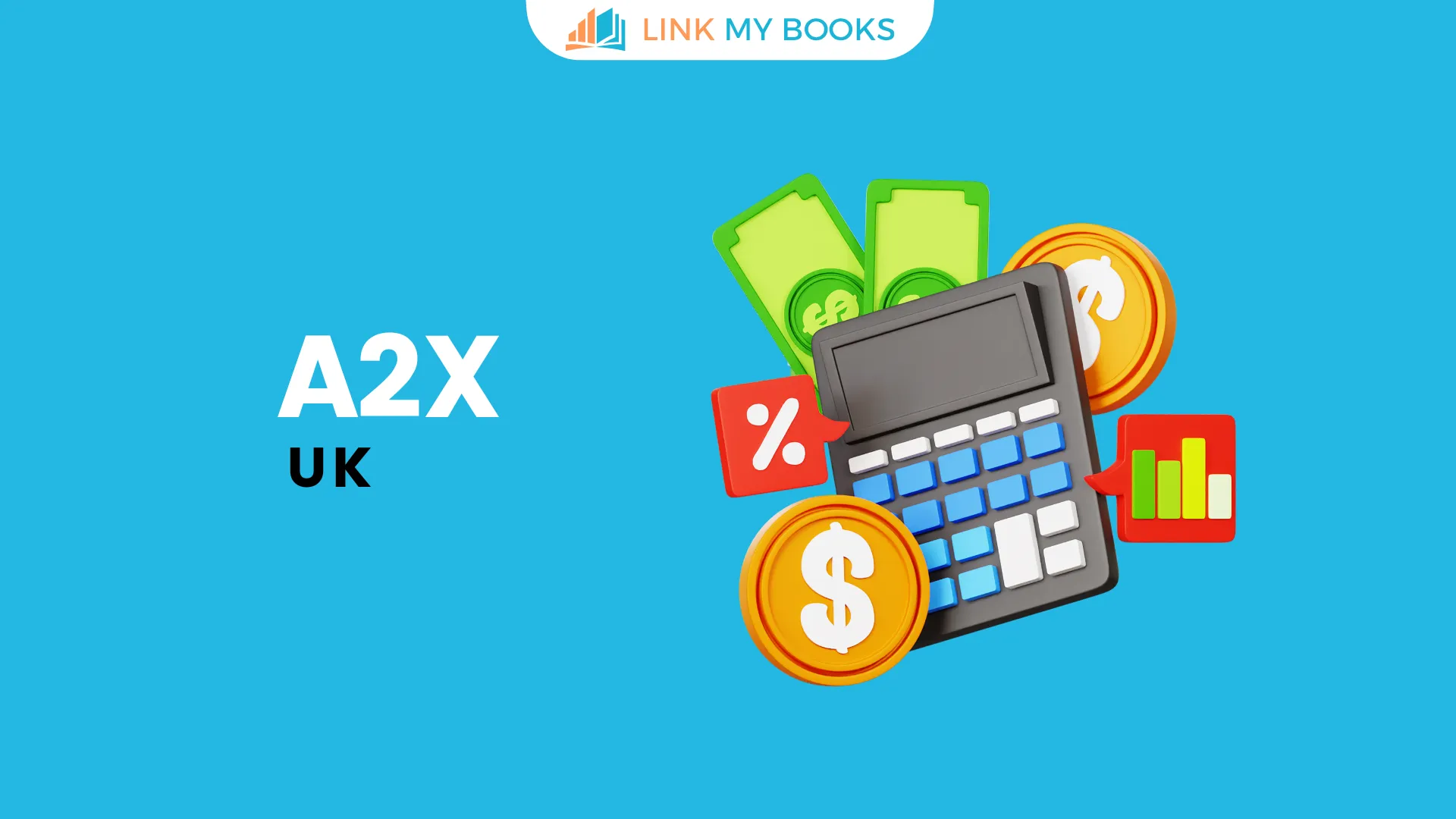










.webp)




.png)